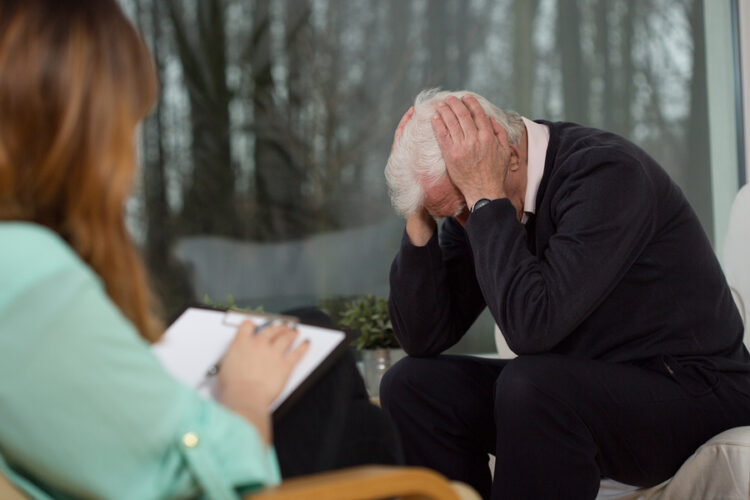You know that eating well, exercising, and getting enough sleep are great steps to taking care of your body and reducing symptoms of serious physical ailments. Well, taking care of your mind isn’t much different. There are lots of good habits that can reduce or delay mental health problems as you get older.
Mental Health Issues and Seniors

The Canadian Institute for Health and Information (CIHI) has found that 14% of seniors admit that they have experienced depression, anxiety, and other forms of mental health issues over the course of their lives. These statistics should be taken with a grain of salt since other research estimates that 1 in 5 citizens experience a mental health problem every year. It’s very likely that more seniors live with mental health problems, but they either don’t recognize the symptoms or don’t seek out professional help.
Too many seniors suffer in silence because of the continuing stigma against mental health issues. They feel ashamed about their symptoms and keep them secret from others. They turn to unhealthy coping mechanisms, and often, they isolate themselves from people who may try to intervene. These are some common mental health issues that you should know about:
Depression

Depression is a mood disorder where you feel prolonged sadness, fatigue, or disinterest in everyday activities. Depression does not have to have a reason to surface — however, and it can be triggered by moments of loss or trauma. These are some of the depression symptoms that you should look out for:
- Lack of energy
- Feeling worthless or hopeless
- Emotional outbursts (crying, anger)
- Sleeping too much or too little
- Suicidal thoughts
Anxiety
Anxiety is a mood disorder where you experience frequent feelings of stress and worry. These stresses are often exaggerated and irrational. These are some anxiety symptoms to look out for:
- Frequent nervousness/restlessness/panic
- Rapid breathing
- Racing heart
- Gastrointestinal problems
- Sleep trouble
Dementia

Dementia is a mental health issue that affects many seniors. There are currently half a million people living with the condition in the country right now. These are some of the symptoms to look out for:
- Emotional outbursts
- Poor impulse control
- Memory loss
- Difficulty problem solving
- Disorientation
What Can You Do to Take Care of Your Mental Health?
Be Social

When you’re retired, you don’t have a workspace to visit or coworkers to chat with. If you live alone, you don’t have someone to eat meals with or sleep beside. If you don’t live close to family or friends, your social interactions may be limited to a few times a week, when you leave the house to run errands or go to appointments. It can be very lonely.
One of the biggest factors that can contribute to mental health issues in seniors is isolation. Social interaction and affection are essential for feeling happy, active, and mentally healthy. If you feel like your social circle is shrinking as you get older, here are some ways to improve that:
- Use technology. If the distance is keeping you apart from loved ones, use tech to keep in touch. Arrange phone calls or video calls with people every week.
- Reconnect with old friends and family members that drifted away. Sometimes people just need you to send an email to let them know that you’re still thinking of them.
- Think about getting a pet. They are a great company, and they will make sure that the house never feels empty.
- Sign up for classes, workshops, and events. It could be anything from a book club to aqua aerobics lessons. These are great opportunities to make friends with like-minded people.
It’s also possible that you may need to change your environment. It can be overwhelming to live in a large empty house filled with memories — some that make you feel sad and alone. So, you may want to think about moving out of isolation and into a community.
A retirement facility like All Seniors Care is an excellent choice because they have a friendly environment where they encourage lots of group activities and events like game nights, craft workshops, exercise classes, and more. They have incredible common areas like a cinema, beauty parlor, barbershop, and chapel. They have so many opportunities to be social and make new friends.
Meditate
One of the best things that you can do to protect your mental health is to meditate on a daily basis — even a few minutes is enough. Meditation is a mindful practice that will release the tension that you are holding in your body, and the stressful thoughts whirring around your head. It can also help people living with anxiety or depression cope with their symptoms.
You don’t have to go to a yoga class to meditate. You can do it in your room. Find a comfortable position, close your eyes, and empty your mind for several minutes. If you need motivation, there are apps and online videos that you can use to direct you through the process.
If it still doesn’t interest you, you can try an activity that has the same benefits as meditation. A crafty activity like knitting is perfect for this. It’s quiet, repetitive, and very calming. Research shows that knitting is known to reduce symptoms of anxiety and make people feel happier. Or you could try filling out coloring books, writing in a journal, or playing music.
Get Help

When you have a toothache, you go to the dentist. When you have a stubborn cough, you visit your doctor. So, when you’re having a difficult time with your mental health, you should seek out a professional in that field.
There are various forms of mental health services, depending on your needs. You can get individual sessions with a psychologist in an office. You can visit a weekly support group. Or, you can talk to therapists online, for example through BetterHelp. There are lots of options out there.
The most important thing that you should know is that you’re not alone. There are millions of people going through the same struggles, who have had to seek help and who are finding effective ways to cope. There are millions that feel happier and healthier after making these changes, and you can too.
 Hi Boox Popular Magazine 2025
Hi Boox Popular Magazine 2025



